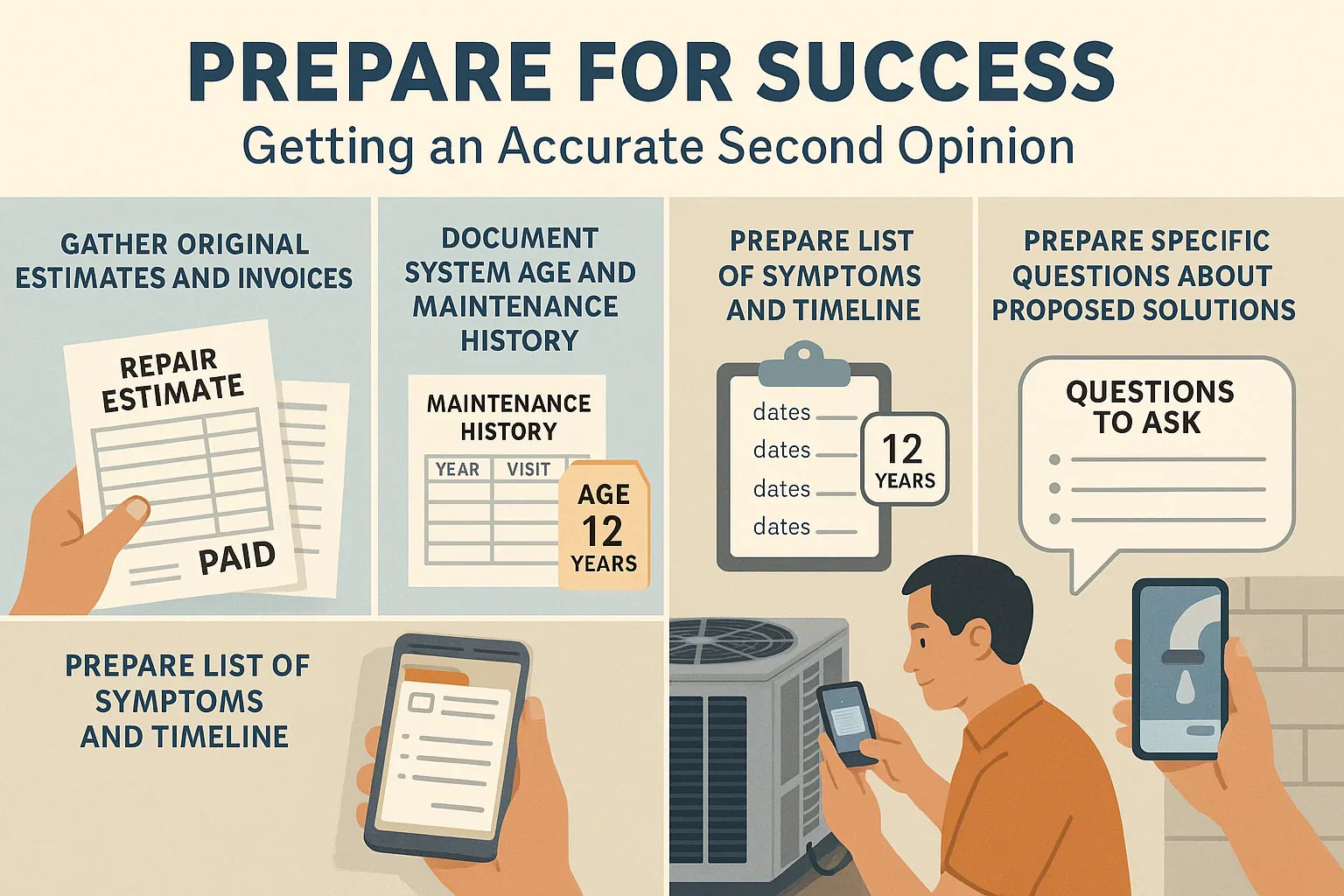When your HVAC system breaks down or shows signs of aging, the first instinct is to call a professional. But what happens when the repair estimate is thousands of dollars—or worse, the contractor says you need a complete replacement?
In those moments, getting a second opinion on HVAC repairs or replacement can save you money, stress, and help you make the smartest choice for your home. This guide walks you through when to seek another quote, what to ask, and how to protect your comfort and safety without overspending.
Why a Second Opinion Can Save You Money and Stress
Not every HVAC quote tells the full story. Some contractors may lean toward replacement because it’s more profitable, while others may push repairs that don’t address long-term efficiency.
A second opinion matters because it:
-
Confirms the accuracy of the original diagnosis.
-
Provides cost comparisons across different contractors.
-
Highlights repair alternatives that may not have been offered.
-
Reduces the pressure of making a rushed, high-cost decision.
If you’re just starting your research, I recommend first reviewing the Should You Replace or Repair Your HVAC System? guide—it gives a broader view of how professionals weigh age, cost, and efficiency.
When You Should Consider a Second Opinion
Not every service call requires a second opinion, but there are certain scenarios where it’s strongly advised:
-
Full replacement on a younger system: If your system is under 10 years old, a recommendation to replace should raise questions. According to the U.S. Department of Energy (DOE), most systems last 10–20 years depending on type and maintenance.
-
Expensive repairs: Bills exceeding $1,000, especially for a single part, should be double-checked.
-
Major components at issue: Repairs involving the compressor, heat exchanger, or blower motor are high-stakes and costly.
-
Safety claims: If you’re told there’s a carbon monoxide risk or fire hazard without a clear explanation, get another expert to confirm.
How to Find a Trustworthy Second Opinion
Not all HVAC contractors are created equal. To get a reliable second opinion:
-
Check licensing and insurance: Only work with state-licensed, insured contractors.
-
Look for certifications: NATE-certified technicians or those authorized by manufacturers have proven expertise.
-
Use professional directories: Organizations like ACCA (Air Conditioning Contractors of America) and ASHRAE list reputable providers.
-
Ask for written estimates: Verbal quotes can’t be compared fairly. A detailed written estimate is your protection.
Questions to Ask During Your Second Opinion
Walking into a second consultation prepared can make all the difference. Here are smart questions to ask:
-
“Can you show me the failed component?” A reputable technician should point out the problem and explain in plain language.
-
“Are there repair alternatives?” Sometimes a system can be stabilized with a smaller repair rather than full replacement.
-
“How long will this repair extend the system’s life?” Be wary if the answer is vague.
-
“Does this system still meet safety and efficiency standards?” Guidance from ENERGY STAR’s maintenance checklist stresses keeping equipment up to modern safety benchmarks.
Documenting these answers allows you to compare contractors apples to apples.
Red Flags That Signal You Need Another Estimate
Sometimes, it’s not just the cost of the estimate that should send you searching for a second opinion—it’s the behavior of the contractor. Watch for:
-
High-pressure sales tactics: “You need to replace today or risk your family’s safety.”
-
No written reports: Vague verbal instructions with no invoice breakdown.
-
Inconsistent explanations: Different technicians from the same company saying different things.
-
Scare tactics without evidence: For example, claiming a carbon monoxide risk but refusing to show a reading.
The Federal Trade Commission (FTC) warns against these types of practices in home repair industries. If you spot them, get another opinion immediately.
Balancing Cost, Safety, and Comfort Before Deciding
At the end of the day, your decision isn’t just about dollars. It’s about balancing three key factors:
1. Cost Considerations
Use the $5,000 Rule: multiply your system’s age by the quoted repair cost. If the total exceeds $5,000, replacement often makes more sense. For example, a 12-year-old system with a $500 repair = $6,000 → replacement is likely the better option. Cost resources like Angi confirm how repair bills climb with age.
2. Safety and Compliance
If your system fails to meet safety standards from groups like ASHRAE, or your contractor cites hazards with electrical, gas, or carbon monoxide, replacement should be prioritized over repairs.
3. Comfort and Efficiency
Beyond costs, a newer system may provide better airflow, humidity control, quieter operation, and lower energy bills. Those improvements can add up over years of ownership.
Final Thoughts
Getting a second opinion isn’t about distrusting your HVAC technician—it’s about protecting your investment, your comfort, and your family’s safety. Another set of eyes can confirm the original diagnosis, present alternative repair options, or uncover potential savings.
Instead of making a rushed decision, compare your options carefully and make sure your choice balances cost, safety, and comfort.
👉 Next in this series: How to Prioritize HVAC Repairs When You Can’t Afford a Replacement Yet
Alex Lane
Your Home Comfort Advocate







